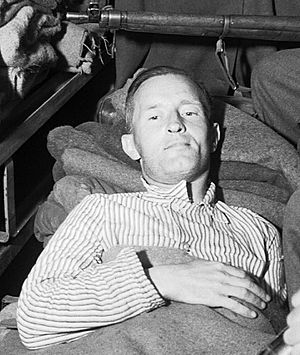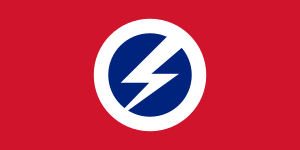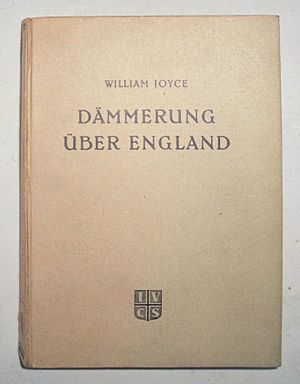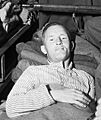William Joyce facts for kids
Quick facts for kids
William Joyce
|
|
|---|---|

Joyce shortly after capture, 1945
|
|
| Born |
William Brooke Joyce
24 April 1906 |
| Died | 3 January 1946 (aged 39) Wandsworth Prison, London, England
|
| Cause of death | Execution by hanging |
| Resting place | New Cemetery, Galway, Ireland |
| Nationality |
|
| Other names | Lord Haw-Haw |
| Education | Birkbeck College, London |
| Known for | Broadcasting German propaganda in World War II |
| Political party | Nazi Party |
| Criminal status | Executed |
| Conviction(s) | High treason |
| Criminal penalty | Death |
William Brooke Joyce (born April 24, 1906 – died January 3, 1946) was an American who became a fascist and a Nazi propaganda broadcaster during World War II. Many people knew him by his nickname, Lord Haw-Haw.
Joyce moved from New York to Ireland, then to England. In England, he joined a group called the British Union of Fascists (BUF) in 1932. When World War II began, he moved to Germany and became a German citizen in 1940.
After the war ended, Joyce was captured. He was found guilty of high treason in the United Kingdom in 1945. He was sentenced to death and was hanged in Wandsworth Prison on January 3, 1946. He was the last person to be executed for treason in the United Kingdom.
Contents
William Joyce's Early Life
William Brooke Joyce was born in Brooklyn, New York, in the United States. His father was Irish Catholic, and his mother was from an Anglo-Irish family. A few years after William was born, his family moved back to Salthill, County Galway, in Ireland.
Joyce went to a Jesuit school in County Galway from 1915 to 1921. His parents supported British rule in Ireland and did not like Irish independence. His mother was a strong Protestant.
Working for British Intelligence
During the Irish War of Independence, when he was a teenager, Joyce worked as a messenger for British military intelligence in County Galway. Some people also thought he was giving information to the "Black and Tans," a British police group. This could have been very dangerous for him.
To keep him safe, a British Army captain helped Joyce join the Worcestershire Regiment in England. However, Joyce was discharged a few months later because he was too young.
Moving to England and Education
Joyce stayed in England, and his family joined him two years later. He studied at Birkbeck College in London, where he earned a degree in English. After college, he wanted to work for the government but was not hired. He then became a teacher.
Joyce became interested in fascism, a political idea that supports a strong leader and national power. In 1924, he was attacked by communists and got a deep cut on his right cheek. This left a permanent scar on his face.
Joining the British Union of Fascists
In 1932, Joyce joined the British Union of Fascists (BUF), led by Sir Oswald Mosley. He quickly became a very good speaker for the group. People were impressed by his powerful speeches.
In 1934, Joyce became the BUF's Director of Propaganda, in charge of spreading their ideas. He was also made the deputy leader. Joyce was known for his strong words and for being willing to fight against people who opposed fascists. His actions made the BUF less popular with many people.
Changes in the BUF
After a violent event at a BUF meeting in 1934, Joyce helped the group focus more on antisemitism, which is hatred towards Jewish people. In 1936, he helped change the group's name to "British Union of Fascists and National Socialists."
Mosley fired Joyce from his paid job in 1937. After that, Joyce started his own group called the National Socialist League. Even though Joyce was an important leader and speaker for the BUF, Mosley later called him a traitor because of what he did during the war.
Broadcasting for Germany
In August 1939, just before World War II started, Joyce and his wife, Margaret, went to Germany. Joyce had heard that British authorities planned to arrest him. He became a German citizen in 1940.
In Berlin, Joyce found a job at the German radio station's English service. His first broadcast was reading the news in English on September 6, 1939, only three days after Britain declared war on Germany. He soon became the main newsreader and writer of talks, making him the station's most famous propaganda broadcaster.
The Name "Lord Haw-Haw"
A newspaper critic named Jonah Barrington first used the nickname "Lord Haw-Haw" in September 1939. He described a broadcaster with a very posh English accent. While it might have been another person at first, the name soon stuck to Joyce as he became the most well-known voice of Nazi propaganda. Joyce himself started using the name on air in 1941, saying, "William Joyce, otherwise known as Lord Haw-Haw."
Joyce's broadcasts started in Berlin and later moved to other cities like Luxembourg City and Apen because of heavy bombing by the Allied forces. His broadcasts were heard across many German-controlled radio stations.
The Impact of His Broadcasts
Joyce also wrote scripts for other German propaganda stations. He eventually told his listeners his real name. People started to believe that Lord Haw-Haw knew secret information about the war.
Even though listening to Joyce's broadcasts was not encouraged, it was not illegal. Many Britons tuned in because they wanted to hear what the other side was saying, especially since information during wartime was strictly censored. At his peak in 1940, Joyce had millions of listeners in the UK.
His broadcasts always began with the words, "Germany calling, Germany calling, Germany calling." He urged the British people to give up and was known for his mocking and threatening tone.
Joyce recorded his last broadcast on April 30, 1945, during the Battle of Berlin. He warned about the "menace" of the Soviet Union and ended with "Heil Hitler and farewell." The next day, British forces took over Radio Hamburg.
Besides broadcasting, Joyce wrote propaganda for British prisoners of war. He tried to get them to join the British Free Corps of the Waffen-SS. He also wrote a book called Twilight Over England, which compared Britain negatively to Nazi Germany. Adolf Hitler gave Joyce awards for his broadcasts, but they never met.
Capture and Trial
On May 28, 1945, British soldiers captured Joyce near the German border with Denmark. An intelligence soldier recognized his voice. When they asked if he was Joyce, he reached into his pocket. Believing he was reaching for a weapon, the soldier shot him, wounding him four times.
Joyce was taken to London and put on trial for high treason. He pleaded "Not guilty."
During the trial, it was found that Joyce had never been a British citizen. This meant he could not be found guilty of betraying a country that was not his own. However, the prosecutor argued that because Joyce had a British passport, he owed loyalty to the British King. This was true even though he had lied to get the passport.
The court decided that because he had a British passport, he was under British protection and therefore owed loyalty to the King when he started working for the Germans. This led to his conviction.
The Appeal
Joyce's conviction was upheld by the Court of Appeal and later by the House of Lords.
Some documents made public later suggest that Joyce might have made a deal with the prosecutors. In return for not revealing his links to British intelligence (MI5), his wife, Margaret, was not charged with treason. She was known to radio listeners as "Lady Haw-Haw."
Execution and Burial
Joyce was executed on January 3, 1946, at Wandsworth Prison. He was 39 years old. He was the second to last person hanged in the UK for a crime other than murder. The last was Theodore Schurch, executed the next day. The hangman for both was Albert Pierrepoint.
Joyce's body was first buried in an unmarked grave inside Wandsworth Prison. In 1976, his daughter, Heather Iandolo, campaigned to have his body moved. He was reburied in New Cemetery, Galway, in Ireland, where he had lived with his family.
Family Life
Joyce had two daughters with his first wife, Hazel. One of his daughters, Heather Iandolo, spoke publicly about her father. She passed away in 2022.
See also
 In Spanish: William Joyce para niños
In Spanish: William Joyce para niños
- Axis Sally
- Hanoi Hannah
- Iva Toguri D'Aquino
- Ezra Pound
- John Amery
- Tokyo Rose
Images for kids
 | Misty Copeland |
 | Raven Wilkinson |
 | Debra Austin |
 | Aesha Ash |






